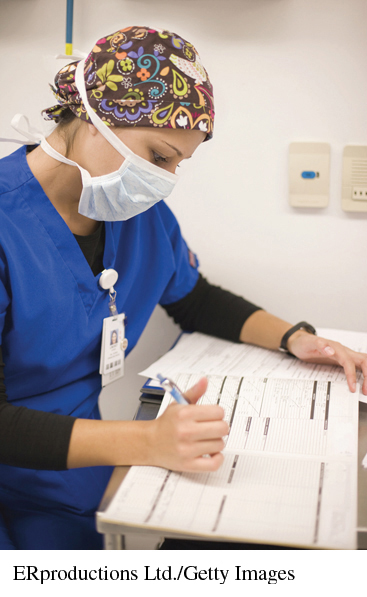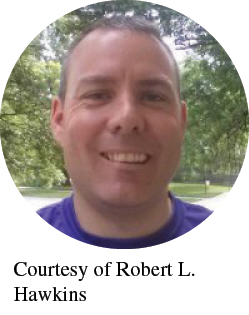Apply Note Taking at Work
By now, we hope you’ve started thinking critically about how to use note taking to master what you’re learning in school. We also hope you’re considering how the ideas in this chapter might help you in your career — whether it’s one you have now or one you might pursue in the future. In this section we explore in more depth how note taking can help you excel at work.
Demonstrate Accuracy and Attention to Detail

Paying attention to details and accurately recording information — two hallmarks of good note taking — are just as important in the workplace as they are in college. How an employee captures detailed information can make or break an organization or a business — and can even have life-and-death implications. Think about it: If a nurse writes down incorrect details about a patient’s drug allergies, that patient could become very ill or could even die if someone prescribes the wrong drug. If a baker mistakenly writes down that a bride wants a chocolate wedding cake instead of vanilla, that unhappy bride could write a negative online review of the bakery — driving potential new customers away. For almost all employees, the ability to capture information accurately is a key job requirement.
Transform Information
Have you ever explained something computer-related to a relative who has no experience with technology? Have you ever studied with a friend and found yourself explaining a complex idea in a way that made the concept more understandable — for your friend and yourself? In scenarios like these, you’re transforming technical or complicated information; in other words, you’re restating it in a way that others can understand. You practice this skill every time you paraphrase while taking notes.
Transforming information is particularly useful in STEM fields (science, technology, engineering, and math), but it’s also useful in sales, education, and many other careers. The more comfortable you feel with absorbing information and restating it in an accessible way, the more effectively you can communicate this information to others in the workplace.
Use the Information You Record
At its heart, note taking involves accurately recording, organizing, and managing information so you can learn from and use it. In the work world, you might use information captured in notes to create slide presentations, press releases, research reports, infographics (which present ideas and data in a visual format), ad campaigns, business plans, and other documents. Whenever you record, organize, and manage information through note taking, you get a chance to communicate what you’ve learned in a clear, understandable, and creative way.
voices of experience: employee
TAKING NOTES ON THE JOB

| NAME: | Rob Hawkins |
| PROFESSION: | Police Lieutenant / U.S. Army Sergeant First Class, Retired |
| SCHOOL: | American Military University |
| DEGREES: | Associate of Arts; Bachelor of Arts |
| MAJORS: | Personnel Administration; Criminal Justice |
“Understanding crime scenes, finding and arresting suspects, writing reports, and getting convictions all require good notes.”
Accurately taking notes and recording information is critical to effective police work. Understanding crime scenes, finding and arresting suspects, writing reports, and getting convictions all require good notes. When I get a call and start to gather information, one of the first things I do is to create a map of the situation. Each node of the map is a different person involved in the case, and I use branches to indicate the relationships among these individuals. I write down information near each node, including what the person observed or what he or she told me. I also put stars next to critical pieces of information and cross things out when I can eliminate a suspect or determine that certain information doesn’t apply. These maps are very useful when I write up case reports — I can look at the maps and understand each situation better. Sometimes maps help me make connections between pieces of information or think of other questions to ask an individual. They stimulate my thinking on the case.
Maps are useful in all kinds of situations, not just during an investigation. I used the same system in the military to create operations orders. Also, when I was training an Afghan battalion commander during my last deployment, I used maps to help him create an organization and structure for the five hundred men he was leading.
YOUR TURN: If you currently have a job and use note taking in your work, explain how you use it and how it helps you. If you don’t currently have a job, identify a job that interests you, and brainstorm how note taking might help you in that job.